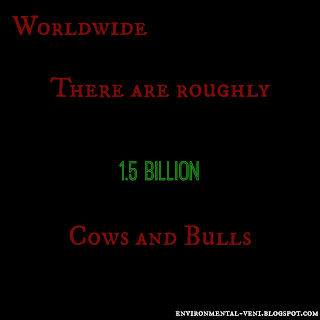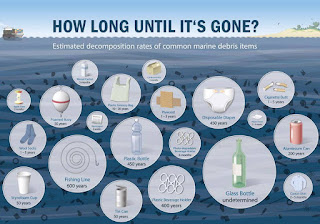Cows & The Environment
Cows release on average between 70 and 120 kg of methane per year. Methane is a greenhouse gas like Carbon Monoxide, but a much higher negative effect. The negative effect that methane has on the environment is roughly 23 times higher than the effect of CO2. The release of just 100kg by a cow per year is equivalent to 2300 kg of CO2 per year by a single cow. All ruminants (which are animals that regurgitate food and re-chew it (gross!)) on the world emit roughly two billion tons of CO2 per year. The clearing of forests for MORE grazing land and farming land is even responsible for 2.8 billion tons of CO2 emissions per year!
The Food and Agriculture Organization of the United Nations states that agriculture is responsible for 18% of the total release of greenhouse gases in the world. Cattle breeding is actually a major factor.
"Livestock are one of the most significant contributors to today's most serious environmental problems. Urgent action is required to remedy the situation."
- Henning Steinfeld, Chief of FAO's Livestock Information and Policy Branch
Livestock are currently using 30 percent of the Earth's entire land surface, which is mostly permanent pastures. Since we can't deny that farming has a major impact on global warming (I am NOT saying you need to tell the farmers to pack up and find a new job/business), we should look at what we're eating. We're eating more meat and dairy products every year. Global meat production is projected to reach 465 million tons by 2050 (from 229 million tons in 1999/2001). Milk production is set to go up from 580 to 1043 million tons.
A Japanese study (I'll try finding the links again!) shows that producing a single kilogram of beef leads to the emission of greenhouse gases with a global warming potential equivalent to roughly 37 kilograms of CO2. To borrow from timeforchange.org:
"It also releases fertilizing compounds equivalent to 340 grams of sulphur dioxide and 59 grams of phosphate, and consumes 169 megajoules of energy. In other words, a kilogram of beef is responsible for the equivalent of the amount of CO2 emitted by the average European care ever 250 Kilometers, and burns enough energy to light a 100-watt bulb for nearly 20 days."
The following table, borrowed from timeforchange.org, indicates the CO2 production in kg CO2 equivalents per kg of meat depending on the animal.
To understand exactly why cows produce so much methane, you have to know a bit more about how they work. Cows, goats, sheeps, many other animals are all called ruminants. Ruminants have four stomachs and they digest their food in their stomachs instead of their intestines, like humans. Ruminants eat food, regurgitate it, and eat it again. They're kind of eating their own vomit. Their stomachs are filled with bacteria that aid in digestion, but also produces methane.
A three year study done by Welsh scientists (starting in 2007), was examining if adding garlic to a cows diet could reduce their methane production. How they thought of garlic, I don't know. but I'm not a cook nor am I a scientist. The study seems to be ongoing, but early results indicated that the garlic being added to their diets cut their flatulence in half by attacking the methane producing microbes that live in a cow's stomach.
When farming first became a big business in the mid-20th century, grazing areas had a wide variety of grasses and flowers that grew naturally. This gave the cows and other animals a rather diverse diet. But in order to improve the efficiency of feeding livestock, many of the pastures became reseeded with ryegrass. Helped along with artificial fertilizers, perennial ryegrass grows very quickly and in large quantities. The downside to this (isn't there always one?) is that it lacks proper nutrition like other grasses and it also prevents the nutritious plants from growing. While this simple diet allows the cows to be fed (duh), it inhibits digestion. This actually causes the cows to be weak and frail, which results in many of them dying or having to be killed very young, as well as being infertile. This, of course, is where the methane comes in.
The hard to digest grass sits in the cows' stomachs and ferments, where it interacts with microbes and produces gas. The exact details of the process are still being studied (as far as I know) and more information will hopefully allow scientists to reduce cows' methane output.
The hard to digest grass sits in the cows' stomachs and ferments, where it interacts with microbes and produces gas. The exact details of the process are still being studied (as far as I know) and more information will hopefully allow scientists to reduce cows' methane output.
There are people who believe that naturally grown pastures with mixed plants and grasses will reduce the greenhouse gases, improve animal health, and meat quality, and reduce the use of artificial fertilizers. I have to say that based on researched information, I agree. Efforts like pills or the garlic in their diets, to me, seems more like a bandaid on a knife-wound, if you know what I mean. It doesn't seem to really address the problems like ground and air pollution, the production of weakened animals that later have to be killed, and artificial fertilizers and steroids.
According to independent.co.uk, the cow is the world's top destroyer of the environment. A United Nations report supposedly identified the world's rapidly growing herds of cattle the be the greatest threat to the climate, forests, and general wildlife. Although there are other ruminants in the world, our 1.5 billion cattle population is the most to blame. Livestock are responsible for about 18 percent of the greenhouse gases that cause global warming. That's more than cars, planes, and all other forms of transport put together.
Burning fuel to grow feed, to produce meat and to transport it - and clearing vegetation for grazing - produces 9 percent of all emissions of carbon dioxide, the most common greenhouse gas. And their wind and manure emit more than one third of emissions of another, methane, which warms the world 20 times faster than carbon dioxide. Livestock produces more than 100 other polluting gases, including more than two-thirds of the world's emissions of ammonia, one of the main causes of acid rain."
-https://www.independent.co.uk/environment/climate-change/cow-emissions-more-damaging-to-planet-than-co2-from-cars-427843.html
Unless drastic changes are made, the massive damage done by livestock will more than double by 2050. Hopefully you'll think about another dish than beef when you're in the market looking for meat.



Comments
Post a Comment